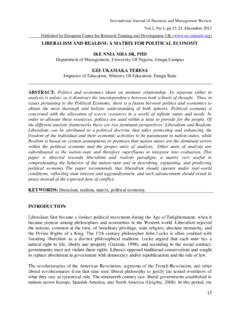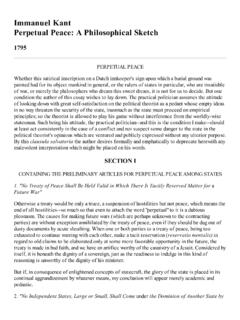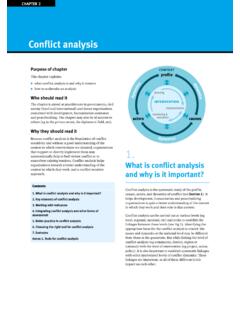Transcription of EFFECTS OF THE CIVIL WAR ON CIVILIAN LIFE POLITICAL …
1 EFFECTS OF THE CIVIL WAR ON CIVILIAN LIFE. POLITICAL CHANGE. - Secession of the southern states had created Republican majorities in both houses of Congress - Within Republican ranks, however, there were differences between the radicals (who wanted immediate abolition of slavery) & the moderates (Free-Soilers who were concerned about economic opportunities for whites). - Most northern Democrats supported the war but criticized Lincoln's conduct of it - peace Democrats and Copperheads opposed the war and wanted a negotiated peace - The most famous Copperhead, Congressman Clement Vallandigham of Ohio, was briefly banished from the to Canada for his treasonable, pro-Confederacy speeches against the war 1. CIVIL LIBERTIES: - In wartime, governments tend to be more concerned with prosecuting the war than with protecting citizens' constitutional rights - Early in the war, Lincoln suspended the writ of habeas corpus in Maryland and other states were there was much pro-Confederate sentiment - Suspension of this constitutional right meant that persons could be arrested without being informed of the charges against them - Nearly 13,000 people were arrested on suspicion of aiding the enemy.
2 Without a right to habeas corpus, many of them were held without trial - Democrats said Lincoln acted no better than a tyrant, but few historians today would go that far in their judgment of the habeas corpus issue - The Constitution says the writ of habeas corpus shall not be suspended, unless in cases of rebellion or invasion the public safety may require it - After the war, in the case of Ex Parte Milligan (1866), the Supreme Court ruled that the government had acted improperly in Indian where, during the war, certain civilians had been subject to a military trial - The Court declared that such procedures could be used only when regular CIVILIAN courts were unavailable 2. THE DRAFT: - At first, those who fought in the CIVIL War were volunteers, but as the need for replacements became critical, both the North and the South resorted to laws for conscripting, or drafting, men into service - Congress' first Conscription Act, adopted in March 1863, made all men between the ages of 20 & 45 liable for military service but allowed a draftee to avoid service by either finding a substitute to serve or paying a $300 exemption fee - The law provoked opposition among poor laborers who feared that when they returned, their jobs would be taken by freed African Americans - In July 1863, riots against the draft erupted in New York City, in which a mostly Irish American mob attacked blacks & wealthy whites - 117 people were killed before federal troops and a temporary suspension of the draft restored order 3.
3 POLITICAL DOMINACNE OF THE NORTH: - The suspension of habeas corpus and the operation of the draft were only temporary - Far more important were the long-term EFFECTS of the war on the balance of power between two sectional rivals, the North and the South - With the military triumph of the North came a new definition of the nature of the federal union - Southern arguments for nullification and secession ceased to be issues - After the CIVIL War, the supremacy of the federal government over the states was treated as an established fact - The abolition of slavery-in addition to its importance to freed African Americans-gave new meaning & legitimacy to the concept of democracy - In his Gettysburg Address of , 1863, Lincoln rallied Americans to the idea their nation was dedicated to the proposition that all men are created equal as Lincoln was probably alluding to the Emancipation Proclamation when he spoke of the war bringing a new birth of freedom - the fact of slavery being abolished advanced the cause of democratic government in the & inspired democracy around the world ECONOMIC CHANGE: 1.
4 FINANCING THE WAR: - The North financed the war chiefly by borrowing $ billion, obtained through the sale of government bonds but this was not enough money - Congress was forced to resort to raising tariffs, adding excise taxes, and instituting the first income tax - The Treasury also issued over $430 million in a paper currency known as Greenbacks - This paper money could not be redeemed in gold, a fact that contributed to inflation in the North as prices rose about 80% during the war - To manage all the added revenue moving in and out of the Treasury, Congress created a National Banking System in 1863. - This was the first unified banking network since Andrew Jackson vetoed the re-charter of the Bank of the United States in the 1830s 2. MODERNIZING NORTHERN SOCIETY: - Economic historians differ on the question of whether, in the short run, the war promoted or restricted the growth of the northern economy - On the negative side, workers' wages did not keep pace with inflation - On the other hand, there is little doubt that many aspects of a modern industrial economy were accelerated by the war - Because the war placed a premium on mass production, it speeded up the consolidation of the North's manufacturing businesses - War profiteers took advantage of the government's urgent needs for military supplies to sell shoddy goods at high prices - Fortunes made during the war honestly or dishonestly produced a concentration of capital in the hands of a new class of millionaires, who would finance the North's industrialization in the postwar years - Republican politics also played a major role in stimulating the economic growth of the North and the West 3.
5 TAKING ADVANTAGE OF THEIR WARTIME MAJORITY IN CONGRESS, THE REPUBLICANS PASSED AN ECONOMIC PROGRAM THAT INCLUDED: a. National Banking System (1863). b. Morrill Tariff Act (1861) raised tariffs to increase revenue & protect manufacturers as it initiated high protective tariffs to help industrialists c. The Homestead Act (1862) promoted settlement of the Great Plains by offering 160 acres of public land to whoever would farm it for 5 years d. Morrill Land Grant Act (1862) encouraged states to use the sale of federal land grants to maintain agricultural and technical colleges e. Pacific Railway Act (1862) built a transcontinental railroad over a northern route to link California & western territories with eastern states SOCIAL CHANGE. Although no part of American society away from the battlefield was untouched by the war, those most directly affected were women of all ages, whose labors became more burdensome, and African Americans, who were emancipated from slavery 1.
6 WOMEN AT WORK: - The absence of millions of men from their normal occupations in fields and factories added to the labor & responsibilities of women at home - Southern & northern women stepped into the labor vacuum created by the war - They operated farms and plantations by themselves or, in the cities, took factory jobs normally held by men - In addition, women played a critical role as military nurses and as volunteers in soldiers' aid societies - When the war ended & the veterans returned home, most urban women vacated their jobs in gov't & industry, while rural women gladly accepted male assistance on the farm - For the women whose men never returned or returned disabled, the economic struggle continued for a lifetime - The CIVIL War had at least two permanent EFFECTS on American women a. The field of nursing was now open to women for the first time' previously, hospitals employed only men as doctors and nurses b. The enormous responsibilities undertaken by women during the war spurred the movement to obtain equal voting rights for women (The suffragists' goal would not be achieved until women's efforts in WWI finally convinced male conservatives to adopt the 19th Amendment).
7 2. END OF SLAVERY. - The group in society whose lives were most profoundly changed by the War were those African Americans who had been born into slavery - After the adoption of the 13th Amendment in 1865, 4 million people ( million in Confederate States, 500,000 in Border States) were freed - For these people & their descendants, economic hardship & POLITICAL oppression would continue for generations, but the end of slavery represented a big step as former slaves with no rights were now protected by the Constitution, with open-ended possibilities of freedom OVERALL IMPACT OF THE CIVIL WAR. While four years of nearly total war, the tragic human loss of 620,000 men, and an estimated $15 billion in war costs and property losses had enormous EFFECTS on the nation, far greater changes were set in motion. The CIVIL War destroyed slavery and devastated the southern economy, and it also acted as a catalyst to transform America into a complex modern industrial society of capital, technology, national organizations, and large corporations.
8 During the war, the Republicans were able to enact the pro-business Whig program that was designed to stimulate the industrial and commercial growth of the United States. The characteristics of American democracy and its capitalist economy were strengthened by this second American Revolution.












